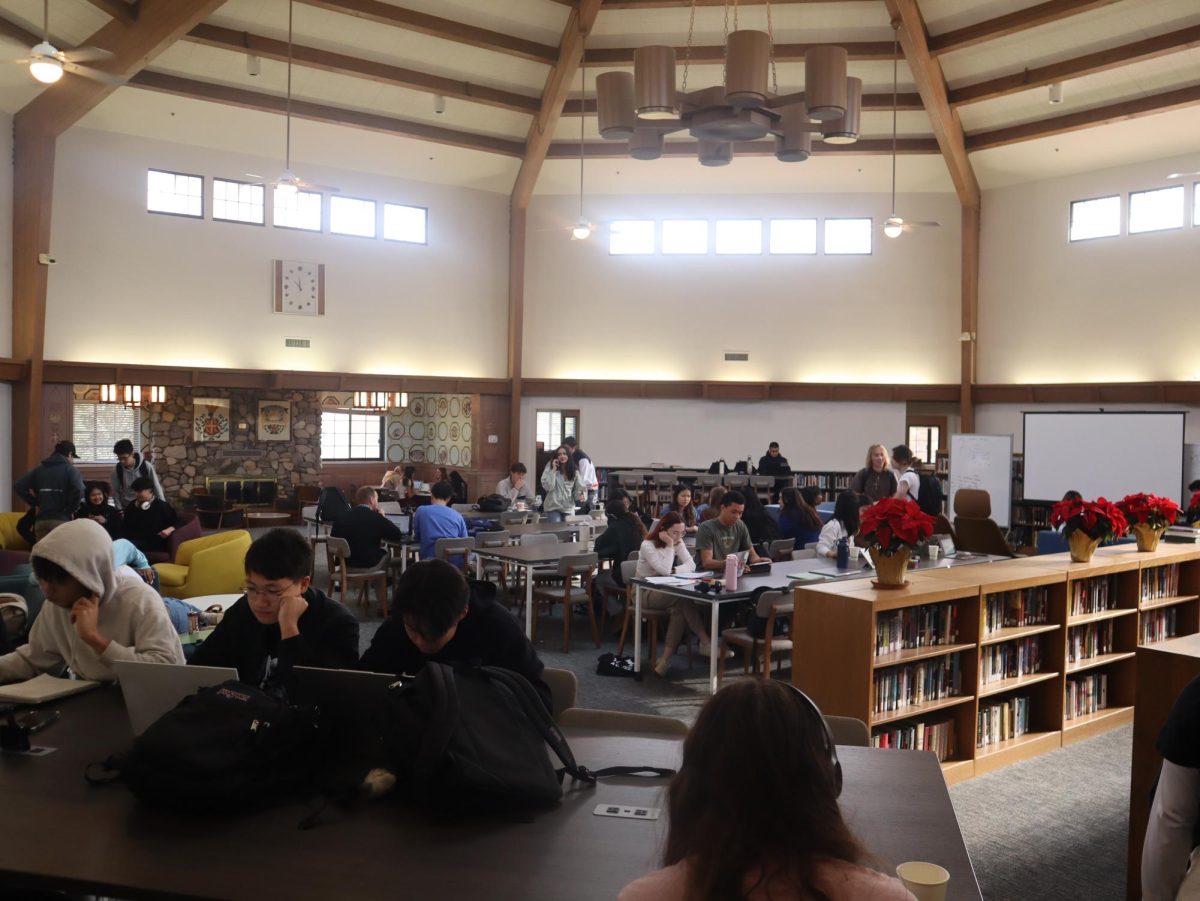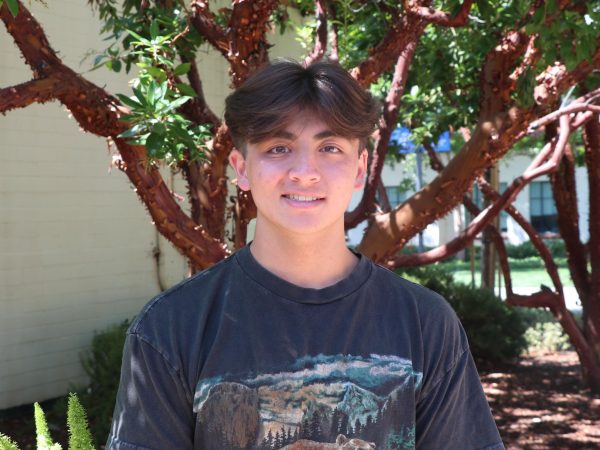Many students enter Webb with lofty goals in mind: dive deep into subjects of intrigue, spearhead innovative passion projects, and network with fellow accomplished peers. These dreams soon fade, pulled back to reality by the school’s false promise of an open, interest-driven curriculum. As students are barred from pursuing their academic goals, contradictory extracurricular restrictions imposed by administration beg the question: Does Webb really want us to succeed?
“The Webb Schools offer a rigorous college-preparatory academic program that provides students a well-rounded liberal arts and sciences education while giving them the space to develop and pursue their passions and interests,” the school’s website reads.
On many fronts, the school does deliver on its academic promises. Beyond supplying students with a world-class education, exemplary educators, and valuable resources, Webb also hosts several extracurricular opportunities at nearby colleges and universities for select students passionate about paleontology, chemistry, and computer science. Yet, at an institution that claims to foster a student’s interests, academic exploration is still heavily policed.
In practice, Webb enforces a strict policy around the pursual of extracurricular “passion projects” that creates a significantly less “unbounded” learning environment than it champions. As advertised academic partnerships with renowned institutions like the Keck Graduate Institute and the University of California, Riverside, hold no real presence on campus, students ambitious to pursue additional opportunities must resort to extra AP tests, academic competitions, dual enrollments, and independent studies to further their education.
Webb’s policies toward taking extra AP tests
Currently, students requesting to take AP tests that are not part of the Webb curriculum must submit petitions at the beginning of the school year and await the consideration of the Director of Studies and Academic Council. Though, on paper, students are welcome to submit all types of petitions, AP English Literature is often the only subject approved.
“There’s a sort of neat alignment between our program and the [AP English Literature] exam, which makes it feel like it’s okay for students to do it,” said Peter Hatala, Director of Studies.
Other courses are often rejected because the administration believes that taking extra AP tests contradicts Webb’s educational philosophy — one that encourages teamwork rather than the individual “grinding.”
However, there is a clear inconsistency within Webb’s attitude. Students are barred from taking certain tests because the admin wants us to engage with the discipline, rather than become mechanical test takers. Why then, are tests like AP Literature — with their rigid timed essays and SAT-like multiple choice questions — approved? Because Webb students can perform well.
Even with this standard, Webb students passionate about other disciplines who have the potential to score high on external AP tests are still held back from demonstrating their academic prowess.
While we acknowledge the importance of collaborative learning, completely blocking out extra opportunities to serve this purpose only isolates students hoping to dive deeper into their passions, which drives many to pursue such interests underground and ironically perpetuating the “solo cramming” that admin wishes to discourage.
Subjective evaluation dictates approval of external competitions
Webb’s restriction of external competitions, particularly in the STEM fields, has also long been contentiously debated. Webb hosts the American Math Competition (AMC) and encourages students to compete in the American Invitational Mathematics Exam (AIME), USA Mathematical Olympiad (USAMO), USA Computing Olympiad, and US Physics Olympiad. Yet, student requests for the USA Biology Olympiad (USABO) are repeatedly rejected.
Webb’s Academic Council — constituted of Mr. Hatala, Tim Coates, Briar Rose Tirpak, Hector Martinez, Dr. Susanna Linsley, Dr. Mark Dzula, and the department chairs — occasionally assesses student proposals with three main considerations: 1) students should act as practitioners within an academic discipline, 2) the experience should align with Webb’s educational philosophy, and 3) the topic should enhance students’ past work with high-level rigor and problem-solving skills. Over the past years, aspiring biology students were discouraged from taking USABO because it contradicted Webb’s educational philosophy.
While their reasoning holds merit, it does not take into full consideration the complex nature of the USA Biology Olympiad. But like the AMC, USAPO, and USACA, the exam has evolved in recent years to include “more thought-provoking, complex questions,” and includes lab challenges during the semifinals and finals rounds — allowing students to build on the AP curriculum they learned in school.
Thus, the Academic Council ought to consider the nuances of each competition and grant students more liberty in making decisions that they see would enhance their educational experience.
Dual Enrollments
Following the AP Computer Science course, students can currently dually enroll in the Advanced computer science course at Harvey Mudd to build on their knowledge.
“I really enjoy taking Harvey Mudd course because it gives me new opportunities to study something that I enjoy beyond what is offered at Webb,” Xenon Poon (‘25) said. “It’s a little bit tricky, but I think it’s very worthwhile for the content and gives me a lot more freedom to learn.”
Dual enrollment courses enhance students’ personal growth and intellectual pursuits. However, students who seek to continue their passions with other fields cannot independently register dual enrollment courses at colleges and universities within the current academic framework. Why is Harvey Mudd the only approved dual enrollment built into the courseload? How can we find a balance between Webb students taking full advantage, while also having the liberty to seek independent pursuits and match Webb’s philosophy of unbounded thinking?
We acknowledge that Webb does not want students dividing time and energy to other commitments, but for students to truly enjoy the breadth and depth of the curriculum offered here, they should not be held back from independent pursuits.
Philips Andover Academy, for instance, offers the Abbot Independent Scholars Program (AISP) that provides seniors the opportunity to independently conduct research with a faculty mentor for course credit. While similar schools like Thacher and Cate also offer a wide array of elective courses comparable to Webb’s Advanced Studies program, they do not prohibit students from independently pursuing AP coursework if it fits within their academic interests.
At Webb, students can engage in these pursuits through the Advanced Studies Humanities Thesis Seminar course and Science Fair Research Lab afternoon activity, but the school nevertheless cannot cater to every niche interest given its small size. Thus, the administration should compensate for these limitations by allowing students to freely engage with materials outside of the high school context to satisfy their intellectual curiosity.
Independent Studies
Students hoping to pursue an independent study must submit a proposal by the course registration deadline; however, they are rarely approved by the academic council.
“Very often, students request to do independent study and realize that they want to take another Webb course instead,” Mr. Hatala said.
To put forth such requests, students must exhaust the course track that is already offered at Webb, according to Michael Hoe, Assistant Head of Schools. Yet, for certain subjects, it is often impossible to fulfill this requirement. For instance, the most accelerated math students take AP Calculus AB during their freshman year and reach either Advanced Studies Multivariable Calculus or Advanced Studies Linear Algebra by their senior year. But if they had already learned these advanced materials outside of class — through summer courses or research — and hope to further challenge themselves with independent studies, they are constrained by this logistical requirement.
How this Affects College Applications
While Webb’s colleges guidance provides necessary waiver for hectic AP test requirements of overseas universities, one concern brought up towards niche academic pursuits was “majoring in high school too soon,” thus limiting students’ exposure to wide opportunities.
“The job of high school is to give students a well-rounded, liberal arts education, to prepare them for multiple paths in life…students will have plenty of time to really specialize once they’ve chosen a major in college,” Mr. Hatala said.
While the statement holds true, it neglects a major portion of today’s college application system: demonstrating one’s passion for a particular field of interest, more commonly known as a spike. Whether through research, internship, dual enrollment courses, or tests, students are expected to demonstrate extensive effort in exploring a certain subject to prove their interests.
Hector Martinez, Director of College Guidance, stressed that the Advanced Studies curriculum created by Webb is better than that of AP classes by nature, and that colleges understand if our students do not take extra tests that are not part of our curriculum.
When it comes to external competitions and research, he shared that the same cost-benefit consideration we use for SAT testing applies: if you’re not good at it, don’t bother.
“If you’re just taking it on because everyone else is taking it on, and you’re not going to stand out, then it’s probably not going to do anything,” Mr. Martinez said. “Sometimes I look at who’s asking to take on these extra things, and they’re not always the straight-A kids who aced everything at Webb and is bored. It’s usually kids that could probably improve in some other subjects.”
By approving or rejecting requests for pursuing extra endeavors based on perceived merit, Webb propels a fixed mindset regarding student potential. Who knows what might happen if they do not give it a shot? It is common knowledge that students need outstanding feats on their college application to stand out, but if we cannot even take risks and venture outside our comfort zones, how can we be expected to succeed?
Conclusion
While we acknowledge Webb’s efforts to provide a world-class curriculum, the school’s promise of an “unbounded” education — one free of bounds, of restrictions — is undermined by rigid policies that prevent students from fully achieving their academic goals. The status quo stratifies students based on their talent levels, reinforcing a self-fulfilling prophecy already embedded in the course selection system.
Instead of continuing such practice, we should focus on expanding the educational opportunities available to Webb students and encouraging them to take proactive steps to further explore a topic of their passion. Webb’s unique environment as a boarding school — while posing many challenges for students’ pursual extracurricular activities off-campus — also opens the door for new, unique possibilities. By acknowledging the limitations within our current model and considering student opinions, we can veritably achieve the simultaneous rigor and flexibility that a Webb education promises to afford.
Staff Vote: 88.2% of the Webb Canyon Chronicle voted to publish this editorial.







![Many Webb students spend their free time in the library watching a popular TV show like Riverdale and Euphoria. “Based off what I’ve seen, like in Euphoria, because the actors are older, they don't showcase an actual high school life properly,” Sochika Ndibe (‘26) said. “Since [the actors] are older [and] playing a teenager, from a girl’s perspective, it is going to make you think you should look more developed at a young age.” The actor, who plays Veronica Lodge, was 22 years old at the time of filming.](https://webbcanyonchronicle.com/wp-content/uploads/2025/03/Antecol-Media-affects-how-society-functions-graphic-1200x900.png)

